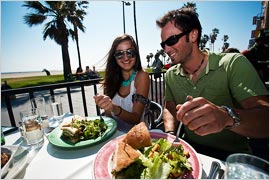restaurants
Food Sales Help Recreation Industry Recovery
- by Karlene Lukovitz @KLmarketdaily, October 31, 2011
 The recreation industry has been struggling
as discretionary spending levels have remained at pre-recession levels.
The recreation industry has been struggling
as discretionary spending levels have remained at pre-recession levels.
But expanded, tailored food offerings geared to attracting value-driven consumers are reviving foodservice sales and helping improve recreational venues’ bottom lines, according to a new report from foodservice research and consultancy firm Technomic.
While recreation foodservice sales actually declined by 2.6% last year, to a retail-sales equivalent of $15.8 billion, that represented a major improvement over 2009, when sales dropped by 10%.
"The recreation segment continues to evolve from a sector with very limited foodservice opportunities to one in which foodservice plays a vital role in attracting and retaining customers," says Technomic director Mary Chapman. “In many cases, their core business — from slot machines to museum exhibits — has been suffering, and restaurants are a key way to help build bottom lines. This creates a lot of opportunity for smart foodservice operators, contract management companies and food manufacturers."
advertisement
advertisement
Some insights from the report, which details trends and strategies within recreation industry segments:
- Restaurant operators, including celebrity chefs, play major roles in attracting consumers to casinos and keeping them on premises. After two years of revenue declines, the gaming industry is starting to show signs of growth.
- Cruise ships have pioneered leveraging foodservice as a lure to new passengers, both through celebrity-chef-designed restaurants and cooking-class cruises offering demonstrations by culinary experts. Worldwide, cruise-ship passengers increased steadily between 2007 and 2009, although rising just 3% in 2009, to 13.4 million.
- Theme/amusement parks are at the mercy of weather, regional tourism rates and competition from less expensive forms of family entertainment, as well as the economy. Operators’ efforts to differentiate parks from other entertainment venues increasingly include aggressive promotions involving lodging and food packages, discounts for prepaid food, and all-you-can-eat special deals.
- Stadiums/arenas are one of the industry’s strongest segments. Major sports attendance is down in some but not all markets, and foodservice is thriving. Concessions have been improved, popular brand names are common, full-service restaurants are proliferating, and the quality of in-suite catering matches that of fine-dining restaurants.
- Movie theaters are another recreation bright spot. Despite Netflix, Red Box vending machines, streaming options and online video sites, box-office sales grew by 20% between 2005 and 2010. "Dinner-and-a-movie" promotions are growing in popularity, and many theater operators have added their own restaurants and lounges.
- Attendance is down for all fine-arts categories, and museums also are being pinched by reduced donations and civic support. However, museums have been among the leaders in upgrading foodservice over the past decade, often with the help of national or local celebrity chefs.
- Membership in sports clubs is down, as is the number of golf rounds being played. As a result, food and beverage revenues -- which account for nearly 30% of an average private club's income --
have declined.
- A bowling chains, such as AMF 300 and Splitsville, are moving ahead with plans to open centers where quality dining is the primary draw and bowling alleys are secondary. When the economy brightens, many other centers will follow the lead of these companies, says Technomic. In the meantime, operators are offering family packages and adult-focused theme nights to court customers.
- Zoos, aquariums, horse and auto racing tracks, fairs and other entertainment attractions have seen declining admissions. These sectors have responded by reducing ticket prices to draw traffic, promoting foodservice facilities as an important reason to visit and offering more trend-forward selections.


